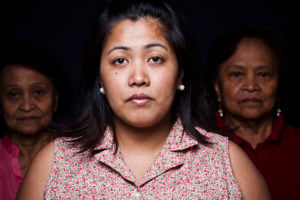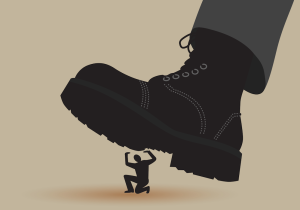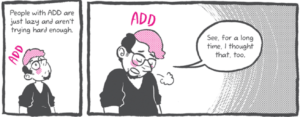(Content Warning: Suicidality)
“I just did something terrible,” I frantically typed, my hands trembling. These were the days of AOL Instant Messenger, with song lyric away messages and 50×50 pixel icons.
“Are you okay?” he writes back. I don’t know what to say. A moment later, another message.
“Sam?”
I type slowly now, deliberately. “I almost died.”
I say this because I don’t know how else to describe what happened. One minute, I can’t breathe, and waves of vibration are spreading across my body as I shake uncontrollably. The next minute, I wake up on the floor.
I failed. And I don’t know how to feel about it.
“Please don’t tell anyone.”
That was seven years ago, but when I close my eyes, it could be yesterday. In the middle of the night, I’m begging my then-boyfriend to do the unthinkable – to keep quiet about my attempt, rather than reaching out for help or taking me to the emergency room.
I ask him to do this because I’m afraid and ashamed. I ask him to do this because I’m just a teenager – a kid, really – and because I don’t know what else to do.
Back then, support for attempt survivors was few and far between. No one expects to come back from something like that – so we’re often forgotten when it comes to resources and advocacy. And as much as I wish I could say that it’s changed significantly, I can’t really say that it has.
I still live with the trauma of what I did. And it’s the loneliest feeling in the world sometimes – to experience something so terrible, but seldom have the space to say what I really feel about it.
After my attempt, I logged offline and I went to bed. I went to class the next day. I tried to live my life as though it never happened. And the toll of never really healing from that – never taking a moment to lick my wounds or repair my spirit – is something that has, no doubt, changed me forever.
But if I’ve learned anything over these last few years as a writer and advocate, it’s that I’m not the only one to be on the other side of an attempt. I’m not the only one that had to move on silently, trying to put all the pieces back together alone. And chances are, if I’m feeling this way, somebody else out there is, too.
So I’m coming clean, talking about what it really feels like to survive – not as a triumph, but as a painful and ongoing process. Recovery not as overcoming, but learning to live with it.
To start, here are five things I’m ashamed to admit as an attempt survivor.
1. I Still Feel Guilty About What I Did
When I think about all of the hearts that would’ve shattered if I had died, I feel a kind of guilt that I can’t explain.
I imagine my parents, losing their youngest child, their wild and interesting and passionate kid that always keeps them on their toes. I think about my brother, losing his little sibling that he grew up with, the one that looked up to him.
I think about everyone that loved me, believed in me. I think about how tremendous that loss would’ve been. And I feel so ashamed, because that’s an imagined pain that I feel responsible for.
I know the truth is more complicated than that. I know that I was struggling with mental illness, unmedicated and undiagnosed, and that I needed help that I wasn’t getting.
I know that my pain exceeded my capacity to deal with it, and that’s not my fault.
I have an endless amount of compassion for the younger me that did everything he could to get through it. I really do.
But sometimes when I’m awake at night, I think about what could’ve happened, the pain I could’ve caused. And no matter how much compassion I have for myself, I still feel horrified. Horrified that it ever got to that point. Horrified that I could’ve hurt people that way.
And this can all be true at the same time – I can be compassionate towards myself, but feel guilty, too. There are stereotypes that say that suicidal people are selfish for the pain they could cause, and while I know that isn’t true, I still feel the weight of that from time to time.
I hold the space for all of it, because recovery isn’t so simple.
2. I’m Afraid I’m Going to Do It Again – Successfully This Time
I can outrun mental illness for a little while, but it always manages to catch back up with me. And as someone for whom suicidality is a real threat, and an undeniable part of my experiences, I’m terrified that the next time I won’t be so lucky.
Whenever I experience a depressive episode, I can’t help but think, “I’m not going to make it out alive this time.”
I can’t help but feel that the deck is stacked against me, and that with each setback, I’m coming closer and closer to death.
I’m scared of dying. I really don’t want to die. But when the depression creeps back up on me, it’s suddenly the only thing I can think about, the only solution that seems reliable.
My attempt seven years ago made me feel so fragile, so vulnerable. At any moment, it felt like mental illness could strike, and I’d be powerless against my impulses.
Could I lose my mind at any moment and suddenly be in danger? How do you protect yourself when the greatest threat to your safety is yourself?
This haunts me. But I find comfort in knowing that I’m still here, after everything that I’ve been through. I may have suicidal impulses, but I also have the protective instincts that have kept me alive so far.
I’m still here – which is a testament not to the power of mental illness, but to my own strength as I push back against it.
3. I Feel Embarrassed That I Failed
I didn’t try hard enough. I didn’t do it “right.” I didn’t come close enough. I should’ve picked another method, another weapon, another setup.
Sometimes I just feel so incredibly dim for not succeeding, even on the days when I’m so glad I didn’t die.
I worry that if people knew that I’d tried and failed, they’d think it was some kind of gesture for attention, that I was somehow less sincere, that I wasn’t really in as much pain as I claimed to be, or that my attempt was somehow cheapened by the way that I did it or how miserably I’d failed.
Some days, I still find myself caught up with this idea that my “failure” is something to be embarrassed about – and, as if the trauma weren’t enough, the humiliation I experience makes it that much worse.
Sometimes I’ve treated suicide attempts like a competition I didn’t win instead of an expression of the deep anguish I was feeling, and my overwhelming desire to be free of that pain.
I forget that it’s not about how close I came to death, but rather, the very stark and terrifying reality that I felt so trapped by my mental illness and my circumstances, I tried to end my life.
Sometimes this lapse in self-compassion can do real damage to my healing and my recovery. And when these thoughts come up for me, I have to remind myself – as many times as it takes – that the outcome of my attempt says nothing about the pain that led up to it.
And most importantly, so many people survive these attempts and struggle with these same feelings because we live in a society that deeply misunderstands suicidality and self-harm.
4. Sometimes I Don’t Understand Why I Did It
Sometimes I ruminate on why this happened to me.
Why didn’t I go to my parents and ask for help? Why didn’t I go to the emergency room? Why didn’t I tell my therapist? Why did I feel like this was the only option or best option of all the options I had?
But I know, deep down, that I was afraid. I was exhausted. I was despondent. And in that moment, I had given everything I had to surviving – and I was at the end of my rope.
Sometimes, asking a suicidal person to “not give up” is like asking someone who’s drowning to just get out of the water. If we had the emotional capacity to try something else, we would – and we often desperately want to.
But sometimes, we’re just too depleted.
Sometimes we just don’t have what we need to keep ourselves afloat and get to shore. So we seek out the quickest and most reliable avenue to relief, because we’ve gone on like this for too long.
I don’t always understand exactly what brought me to that point seven years ago. But I do know that I did everything I could to keep myself alive leading up to it. And rather than punishing myself for trying to end my suffering, it’s important that I have compassion for the person who was in that much pain.
Because that pain was real. And that pain wasn’t and will never be my fault.
5. I’m Angry That I Can’t Just ‘Get Over It’
Sometimes I feel bitter that I can’t just “move on.” Bitter that I dwell on the past so much. Bitter that a single moment in my life can take on a significance that I never wanted it to have.
My attempt has been an unwanted guest in my life for a long time, and while its visits are less frequent as the years go by, I sometimes still find myself angry that it won’t just disappear altogether.
Late at night, when I still lived in the house where it happened, I’d have these weird flashbacks.
Sometimes, if I left the door shut and the light on behind me, I’d panic – imagining that my younger self was in there, as if I were in some parallel universe where if I just swung open that door in time, I could stop it from ever happening.
Even though I logically knew this wasn’t possible, I fell for it every time. At first I’d wait, telling myself it couldn’t be true – but the logic failed because it felt so real to me.
I’d push open the door, prepared to save the day. But the room would be empty, my teenage self nowhere to be found.
Every time, when I realized I couldn’t stop it – because it had already happened years ago – I’d feel this mix of despair and anger. I wanted to forget. But my mind wouldn’t let me.
But repeat after me: Anger is a natural and expected response to trauma and grief.
Of course we’re angry. Something unthinkable has happened, and now we must carry that with us. It’s unjust. Sometimes, it’s even unbearable.
Asking myself to just “get over it” is asking my mind and my body to process trauma in a way it’s simply not capable of doing. And not only is that expectation unrealistic – it’s actually unfair.
***
What helps me the most is remembering that recovery happens at its own pace. We don’t get to will ourselves into determining how quickly we come to terms with something.
When I feel angry, I let myself feel angry. When I feel embarrassed, guilty, fearful, or confused, I let myself have those feelings, too.
But I also try to feel patience, knowing that this is going to take time – but that given time, it will get easier.
Every year, it’s a little easier. I’ve stopped looking for my ghost in another room, in another universe. And I’ve started taking care of myself – the self that’s here, right now, quietly and courageously surviving.
*If you’re feeling suicidal, please reach out to someone. If you’re in the US you can reach the National Suicide Prevention Lifeline at 1.800.273.8255. If you’re not in the US, click here for a link to crisis centers around the world.
For more information on how to actively support suicide attempt survivors, please check out this article for more insight.
[do_widget id=’text-101′]
Sam Dylan Finch is a Contributing Writer at Everyday Feminism and the Associate Editor at RESIST. He is a transgender writer, activist, and educator based in the San Francisco Bay Area. He is also the founder of Let’s Queer Things Up!, a blog exploring the intersections of mental illness and queerness. You can learn more about him here, admire his face on Instagram, check out his portfolio, and become best friends on Twitter @samdylanfinch. Read his articles here.
Search our 3000+ articles!
Read our articles about:
Our online racial justice training
Used by hundreds of universities, non-profits, and businesses.
Click to learn more





















